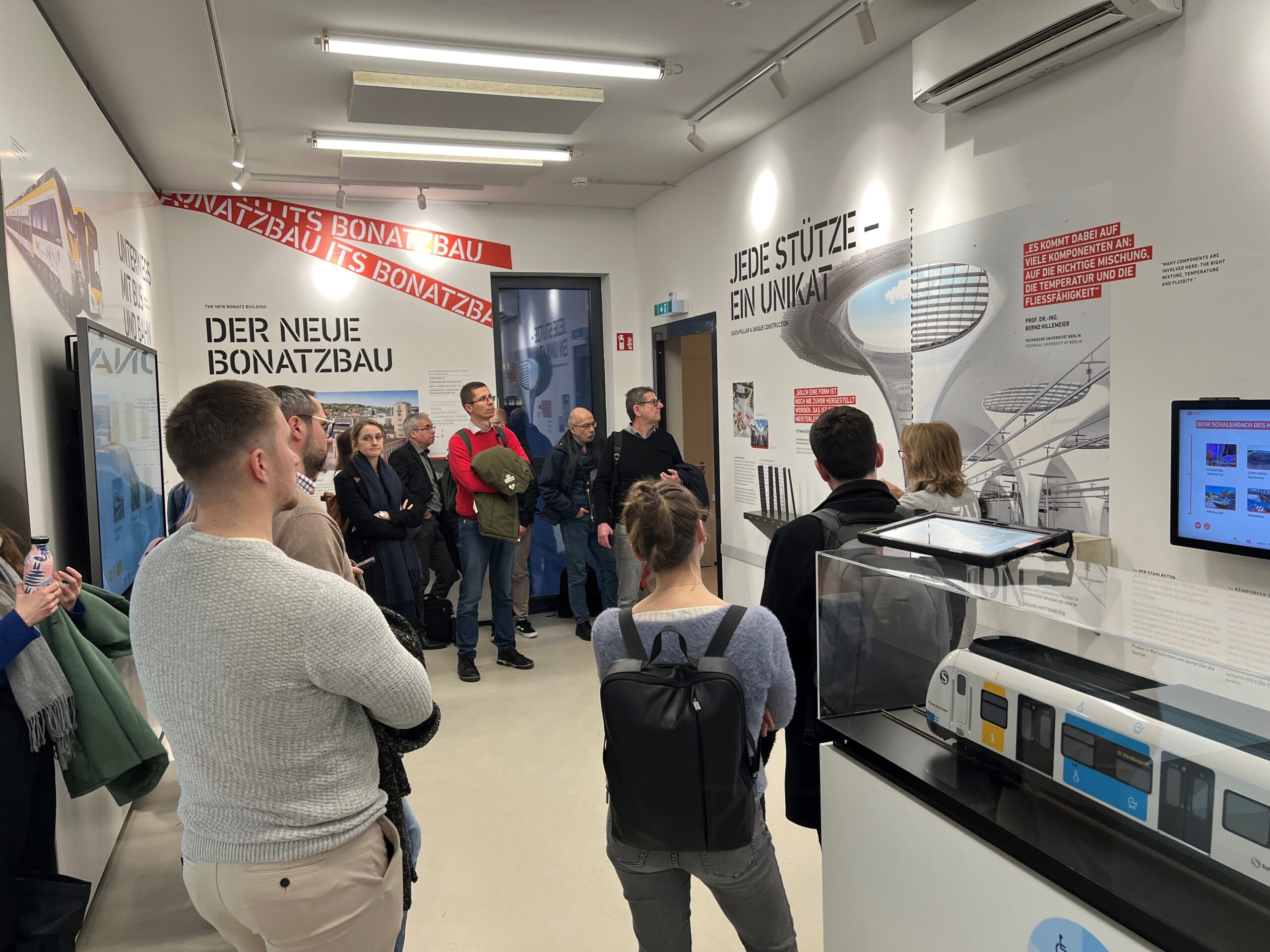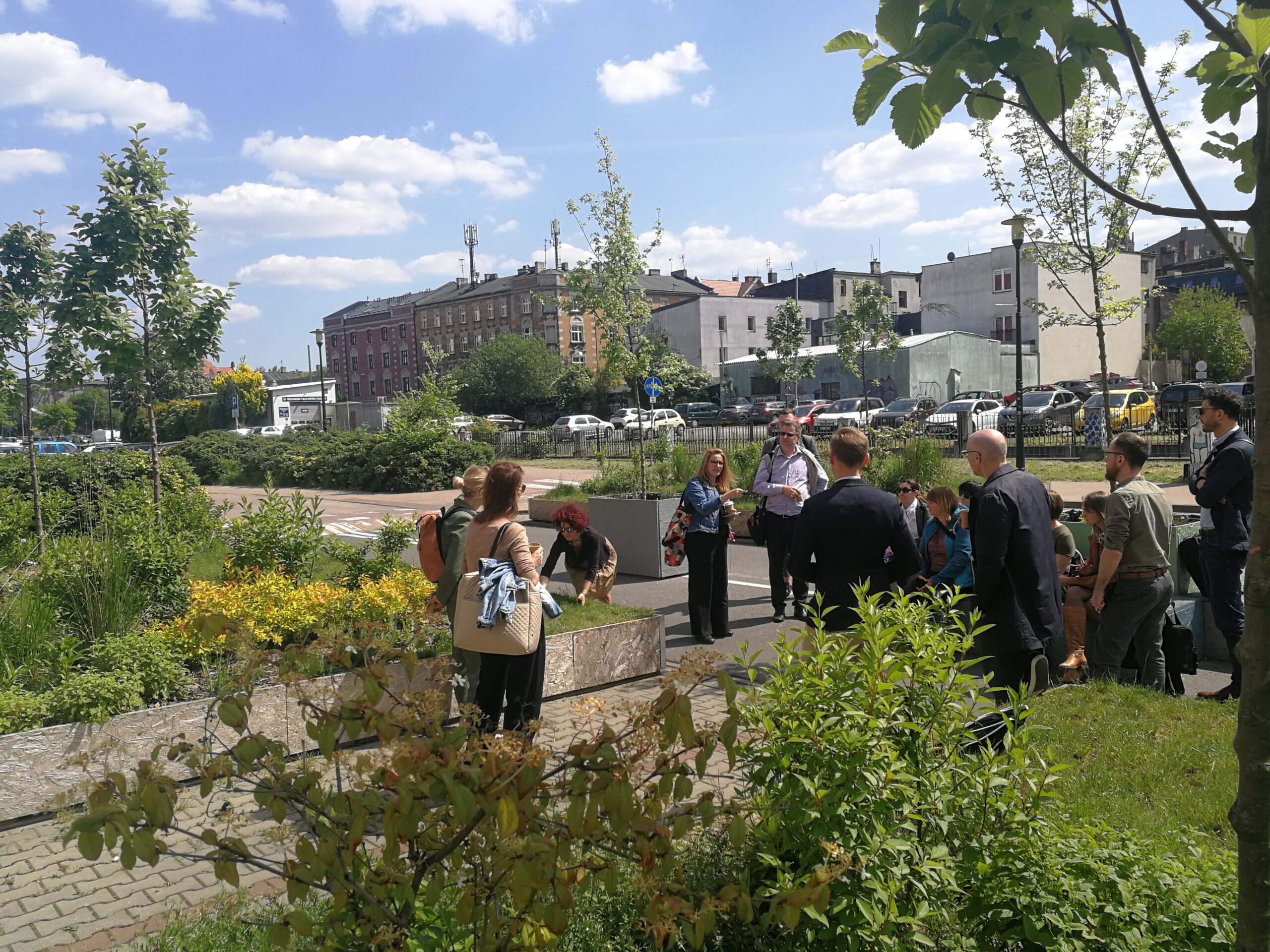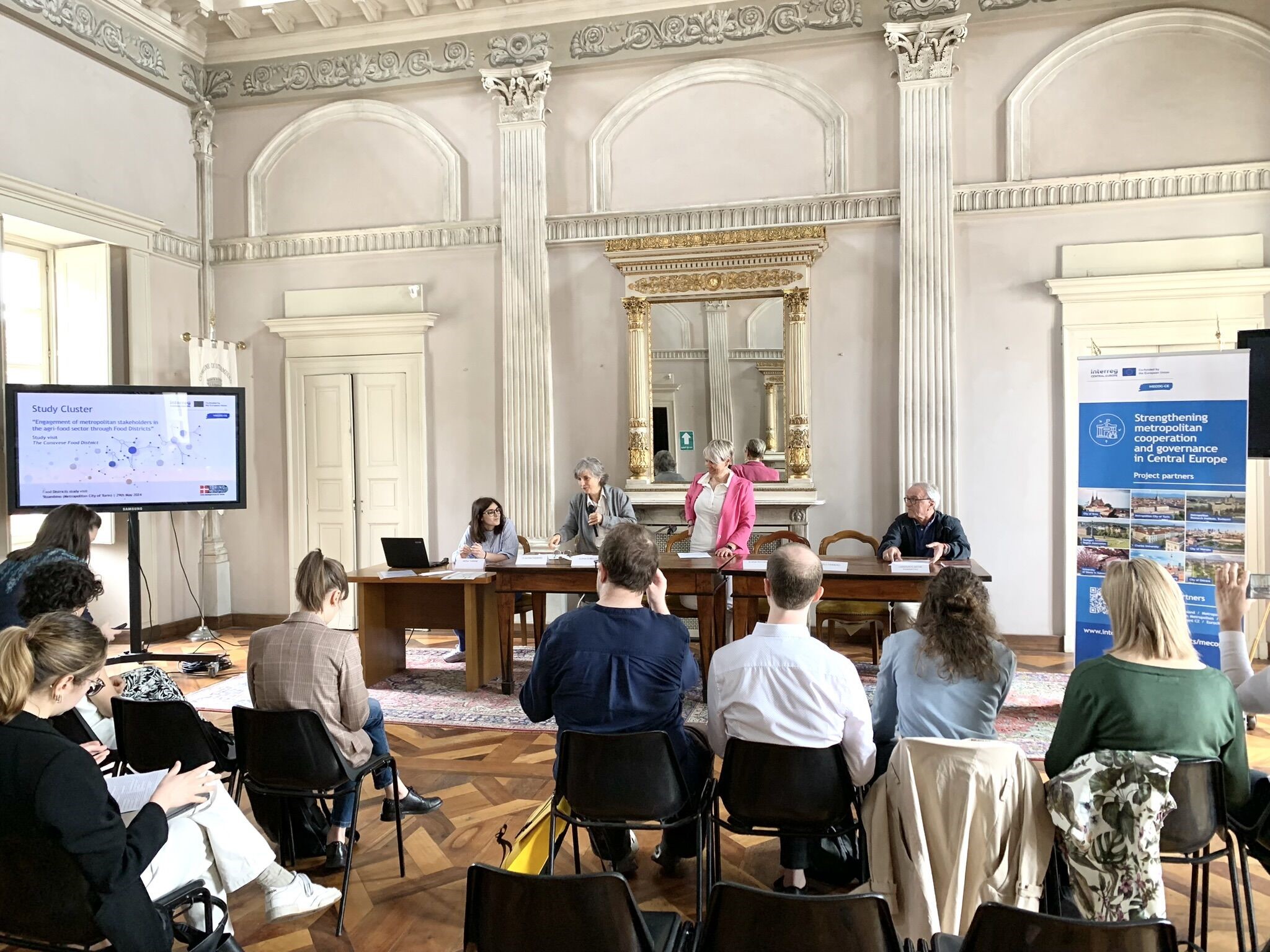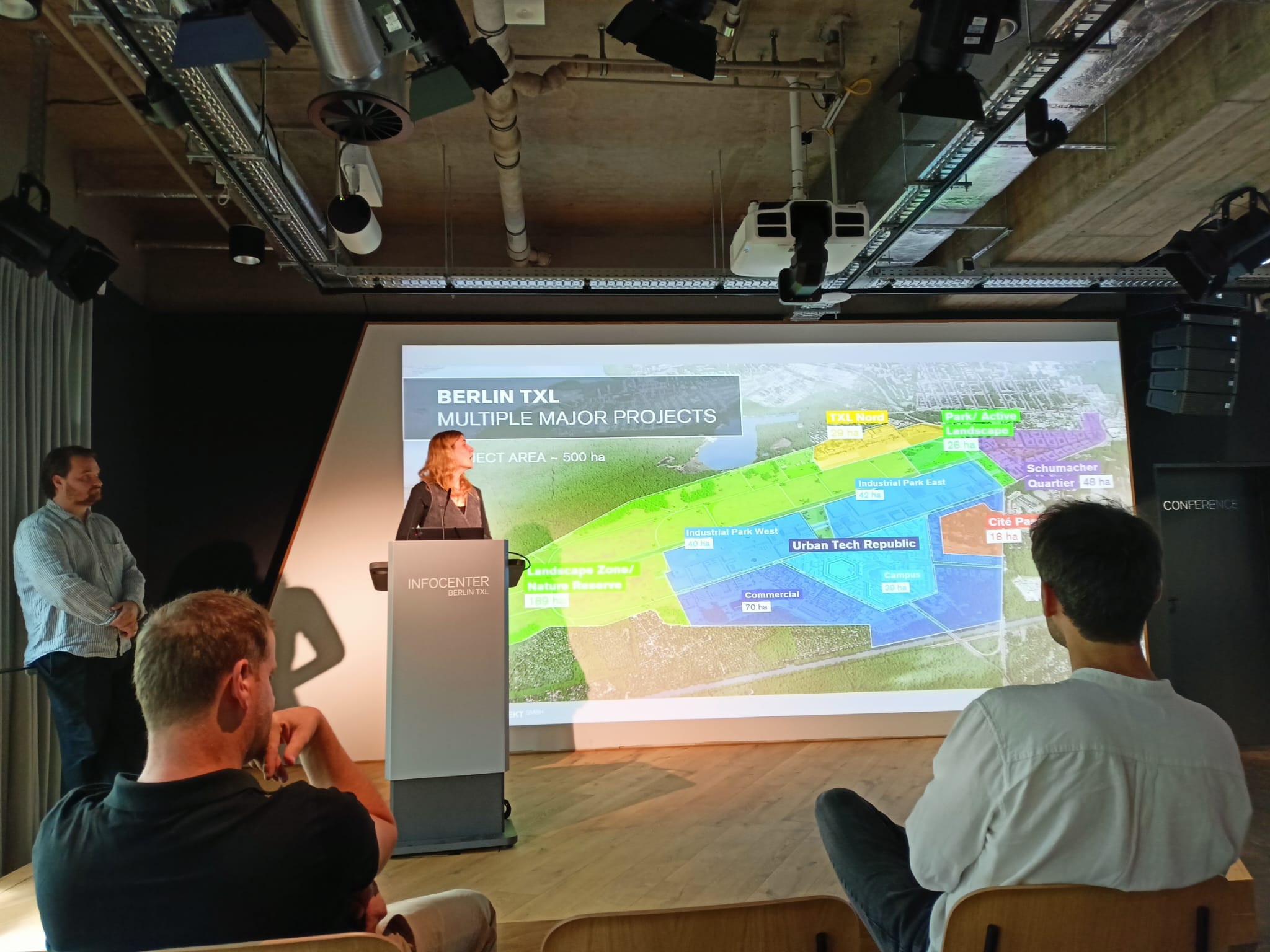The study visits took place in MECOG-CE project partners’ metropolitan areas Stuttgart, Katowice (GZM), Turin and Berlin-Brandenburg. The series of visits are an integral part of study clusters’ activities, providing valuable opportunities for partners to exchange expertise face-to-face and learn from each other’s experience with the aim to strengthen capabilities required to transfer selected best practices and initiate pilot actions in the partners’ metropolitan areas. Mobility and planning – study visit in Stuttgart Early in February, the first study visit of the year took place in Stuttgart. Partners learned about the structure and functioning of the Stuttgart Region Association, with an emphasis on metropolitan cooperation and spatial planning. Furthermore, partners from Warsaw learned about the metropolitan transport system functioning in Stuttgart Region. They also toured the S21 project, gaining insights into large-scale transportation infrastructure – Stuttgart-Ulm Railway project and Reorganisation of the Stuttgart Rail Node. This provided an in-depth understanding of large-scale transportation infrastructure projects and their implications for regional development.  Prototyping academies – study visit in Katowice The project partners from the City of Ostrava and Stuttgart were familiarized with the experience of the Prototyping academies, specifically past initiatives including the Urban Greenery Management project in Radzionków and the pending Good Quality Neighbourhood project. The Prototyping academies are based on the methodology supporting low-cost, transferable prototype solutions to address challenges in public spaces. The session provided rich insights and many practical application tips for participants, such as a focus on communication, involvement of public from the beginning, connection with the relevant stakeholders, meetings outside, using maps and many others. The visit also included a tour around the Prototyping academy at the University of Silesia campus.
Prototyping academies – study visit in Katowice The project partners from the City of Ostrava and Stuttgart were familiarized with the experience of the Prototyping academies, specifically past initiatives including the Urban Greenery Management project in Radzionków and the pending Good Quality Neighbourhood project. The Prototyping academies are based on the methodology supporting low-cost, transferable prototype solutions to address challenges in public spaces. The session provided rich insights and many practical application tips for participants, such as a focus on communication, involvement of public from the beginning, connection with the relevant stakeholders, meetings outside, using maps and many others. The visit also included a tour around the Prototyping academy at the University of Silesia campus.  Food district – study visit in Turin The Metropolitan City of Turin hosted a visit in Food District (FD) Canavese. This best practice aims at enhancing the local agri-food production system and involves both public and private entities such as municipalities, water management consortium and agri-cooperatives, professional agricultural organisations, agro-industrial enterprises, Chamber of Commerce, research institutions and others. During the study visit, the partners had the invaluable opportunity to listen to private sector entities. Additionally, Turin shared its extensive experience in district management, offering insights from various stakeholders. Another valuable part of the visit was the on-site tour in one of the FD members — a rice processing mill — which provided an in-depth look at the operational practices within the industry. Our partners from Brno have gained a deeper understanding of functioning and successful implementation of this best practice.
Food district – study visit in Turin The Metropolitan City of Turin hosted a visit in Food District (FD) Canavese. This best practice aims at enhancing the local agri-food production system and involves both public and private entities such as municipalities, water management consortium and agri-cooperatives, professional agricultural organisations, agro-industrial enterprises, Chamber of Commerce, research institutions and others. During the study visit, the partners had the invaluable opportunity to listen to private sector entities. Additionally, Turin shared its extensive experience in district management, offering insights from various stakeholders. Another valuable part of the visit was the on-site tour in one of the FD members — a rice processing mill — which provided an in-depth look at the operational practices within the industry. Our partners from Brno have gained a deeper understanding of functioning and successful implementation of this best practice.  Regional cooperation – study visit in Berlin-Brandenburg The study visit to the Capital Region Berlin-Brandenburg focused on regional cooperation, particularly the work and competencies of the project partner Joint Spatial Planning Department Berlin-Brandenburg and the best practice Municipal Neighbourhood Forum (MNF). Local partners and experts explored the MNF-topic “Strengthening centres and city centres,” using Potsdam as a case study to discuss the current and future roles of city centres and potential solutions for introducing new mixed uses. Another key topic was the north-east development axis of the Berlin-Brandenburg metropolitan area, crucial for residential, commercial, and scientific growth and cooperation between the Berlin city district of Pankow and the Brandenburg municipality of Wandlitz. Participants also visited the former Tegel Airport, where the 500 ha “Urban Tech Republic TXL” district is being developed for research, innovation, and sustainable housing.
Regional cooperation – study visit in Berlin-Brandenburg The study visit to the Capital Region Berlin-Brandenburg focused on regional cooperation, particularly the work and competencies of the project partner Joint Spatial Planning Department Berlin-Brandenburg and the best practice Municipal Neighbourhood Forum (MNF). Local partners and experts explored the MNF-topic “Strengthening centres and city centres,” using Potsdam as a case study to discuss the current and future roles of city centres and potential solutions for introducing new mixed uses. Another key topic was the north-east development axis of the Berlin-Brandenburg metropolitan area, crucial for residential, commercial, and scientific growth and cooperation between the Berlin city district of Pankow and the Brandenburg municipality of Wandlitz. Participants also visited the former Tegel Airport, where the 500 ha “Urban Tech Republic TXL” district is being developed for research, innovation, and sustainable housing.  Sharing Expert Experience and Building Capacity These study visits offered members of several study clusters to see the practical applications of the presented best practices and understand the innovative approaches being implemented in the metropolitan areas. We extend our gratitude to all participants and project partners for their efforts in sharing their expertise, learning from each other, and improving their capabilities to tackle metropolitan challenges and strengthen metropolitan cooperation.
Sharing Expert Experience and Building Capacity These study visits offered members of several study clusters to see the practical applications of the presented best practices and understand the innovative approaches being implemented in the metropolitan areas. We extend our gratitude to all participants and project partners for their efforts in sharing their expertise, learning from each other, and improving their capabilities to tackle metropolitan challenges and strengthen metropolitan cooperation.
 Prototyping academies – study visit in Katowice The project partners from the City of Ostrava and Stuttgart were familiarized with the experience of the Prototyping academies, specifically past initiatives including the Urban Greenery Management project in Radzionków and the pending Good Quality Neighbourhood project. The Prototyping academies are based on the methodology supporting low-cost, transferable prototype solutions to address challenges in public spaces. The session provided rich insights and many practical application tips for participants, such as a focus on communication, involvement of public from the beginning, connection with the relevant stakeholders, meetings outside, using maps and many others. The visit also included a tour around the Prototyping academy at the University of Silesia campus.
Prototyping academies – study visit in Katowice The project partners from the City of Ostrava and Stuttgart were familiarized with the experience of the Prototyping academies, specifically past initiatives including the Urban Greenery Management project in Radzionków and the pending Good Quality Neighbourhood project. The Prototyping academies are based on the methodology supporting low-cost, transferable prototype solutions to address challenges in public spaces. The session provided rich insights and many practical application tips for participants, such as a focus on communication, involvement of public from the beginning, connection with the relevant stakeholders, meetings outside, using maps and many others. The visit also included a tour around the Prototyping academy at the University of Silesia campus.  Food district – study visit in Turin The Metropolitan City of Turin hosted a visit in Food District (FD) Canavese. This best practice aims at enhancing the local agri-food production system and involves both public and private entities such as municipalities, water management consortium and agri-cooperatives, professional agricultural organisations, agro-industrial enterprises, Chamber of Commerce, research institutions and others. During the study visit, the partners had the invaluable opportunity to listen to private sector entities. Additionally, Turin shared its extensive experience in district management, offering insights from various stakeholders. Another valuable part of the visit was the on-site tour in one of the FD members — a rice processing mill — which provided an in-depth look at the operational practices within the industry. Our partners from Brno have gained a deeper understanding of functioning and successful implementation of this best practice.
Food district – study visit in Turin The Metropolitan City of Turin hosted a visit in Food District (FD) Canavese. This best practice aims at enhancing the local agri-food production system and involves both public and private entities such as municipalities, water management consortium and agri-cooperatives, professional agricultural organisations, agro-industrial enterprises, Chamber of Commerce, research institutions and others. During the study visit, the partners had the invaluable opportunity to listen to private sector entities. Additionally, Turin shared its extensive experience in district management, offering insights from various stakeholders. Another valuable part of the visit was the on-site tour in one of the FD members — a rice processing mill — which provided an in-depth look at the operational practices within the industry. Our partners from Brno have gained a deeper understanding of functioning and successful implementation of this best practice.  Regional cooperation – study visit in Berlin-Brandenburg The study visit to the Capital Region Berlin-Brandenburg focused on regional cooperation, particularly the work and competencies of the project partner Joint Spatial Planning Department Berlin-Brandenburg and the best practice Municipal Neighbourhood Forum (MNF). Local partners and experts explored the MNF-topic “Strengthening centres and city centres,” using Potsdam as a case study to discuss the current and future roles of city centres and potential solutions for introducing new mixed uses. Another key topic was the north-east development axis of the Berlin-Brandenburg metropolitan area, crucial for residential, commercial, and scientific growth and cooperation between the Berlin city district of Pankow and the Brandenburg municipality of Wandlitz. Participants also visited the former Tegel Airport, where the 500 ha “Urban Tech Republic TXL” district is being developed for research, innovation, and sustainable housing.
Regional cooperation – study visit in Berlin-Brandenburg The study visit to the Capital Region Berlin-Brandenburg focused on regional cooperation, particularly the work and competencies of the project partner Joint Spatial Planning Department Berlin-Brandenburg and the best practice Municipal Neighbourhood Forum (MNF). Local partners and experts explored the MNF-topic “Strengthening centres and city centres,” using Potsdam as a case study to discuss the current and future roles of city centres and potential solutions for introducing new mixed uses. Another key topic was the north-east development axis of the Berlin-Brandenburg metropolitan area, crucial for residential, commercial, and scientific growth and cooperation between the Berlin city district of Pankow and the Brandenburg municipality of Wandlitz. Participants also visited the former Tegel Airport, where the 500 ha “Urban Tech Republic TXL” district is being developed for research, innovation, and sustainable housing.  Sharing Expert Experience and Building Capacity These study visits offered members of several study clusters to see the practical applications of the presented best practices and understand the innovative approaches being implemented in the metropolitan areas. We extend our gratitude to all participants and project partners for their efforts in sharing their expertise, learning from each other, and improving their capabilities to tackle metropolitan challenges and strengthen metropolitan cooperation.
Sharing Expert Experience and Building Capacity These study visits offered members of several study clusters to see the practical applications of the presented best practices and understand the innovative approaches being implemented in the metropolitan areas. We extend our gratitude to all participants and project partners for their efforts in sharing their expertise, learning from each other, and improving their capabilities to tackle metropolitan challenges and strengthen metropolitan cooperation.